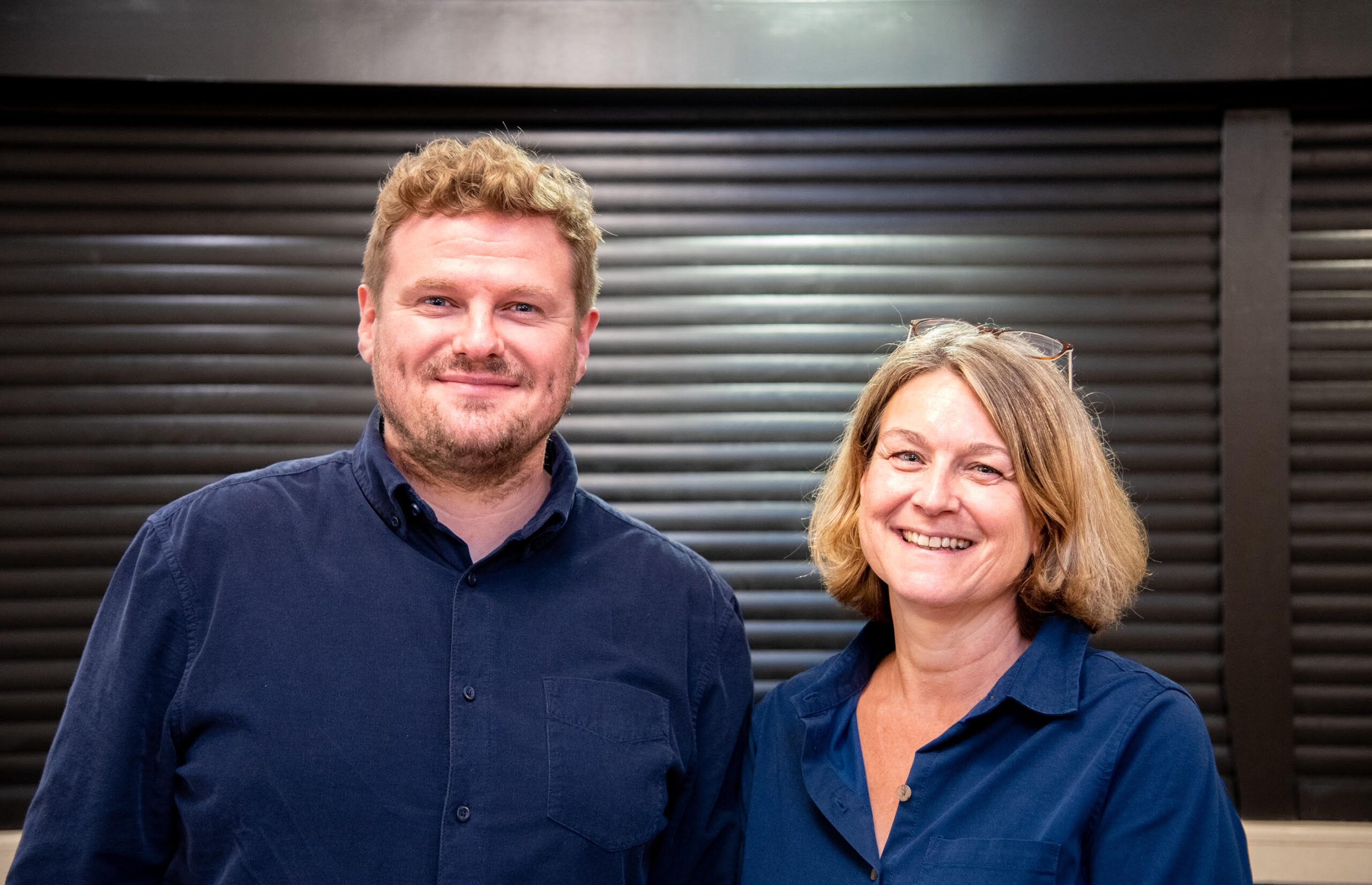Jim Gore with his Global Wine Academy and Erica Dent with her Enjoy Discovering Wine business on the skills needed to be a good wine educator.
Tell us about your background and how you got into wine?
Erica: I went travelling in my late 20s and ended up living in New Zealand, where I decided to do something completely different (previous work life was dull number crunching). So I took myself off to Gisborne to live on the beach, went to college and gained my New Zealand Certificate in Viticulture and Wine Science.
Upon my return to the UK I worked my way through the WSET qualifications completing my diploma in 2003, by which time I was working at the WSET head office managing their events.
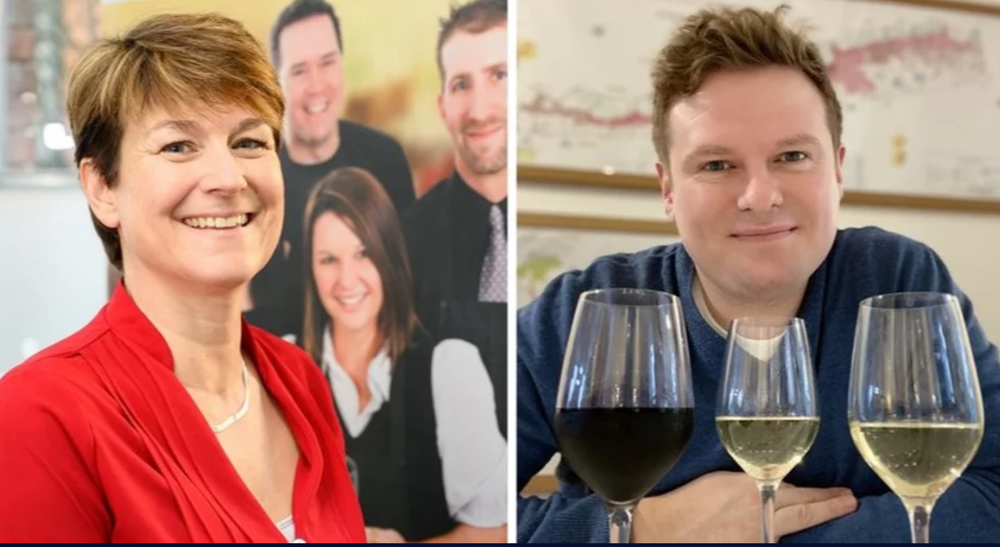
Erica Dent and Jim Gore have joined forces to run WSET diploma theory online courses
Jim: My parents took me to Burgundy every summer as a child, my mother was a teacher so we capitalised on that time. It seemed like we were dragged around every Cave Cooperative in Burgundy, Beaujolais and the Northern Rhone, so wine has somewhat been part of our lives as long as I can remember. My first waitering job at a restaurant used Oddbins as its supplier for is wine list and I ended up working for Oddbins for seven years during and after university. They put me through my Level 2, 3 and 4 during that time. I spent a few years in Burgundy (my parents eventually moved there) before I joined the WSET.
What sort of roles have you had in the sector?
Erica: Apart from my time at the WSET I was initiated into the trade as a runner for the International Wine Challenge, where I found inspiration in particular through the wonderful Charles Metcalfe. It just seemed such a lovely industry to be in, and that prompted me to apply to work at the Trust. My first role was part-time cellar rat (setting up classrooms and cleaning glasses).
Jim: Restaurant work then a wine shop assistant which turned into a managerial role, examination co-ordinator at WSET Awards, Level 2 programme nanager at WSET School, principal at WSET School London, and finally created The Global Wine Academy which focuses on small group education for wine students. It has been just over 18 years in the trade overall.
Why did you want to get into wine education – had you been interested in being a teacher or lecturer in the past?
Erica: Never. I hated exams and was terrified of presenting to groups of adults. Let’s just say I was firmly encouraged by WSET’s incomparable director of education, Karen Douglas, who saw something in me that was definitely not on my radar. But once I started, I was hooked … She was right.
Jim: Erica told me I should do it and she is right most of the time. I am a people person and am always thirsty for more knowledge, so I found the techniques I needed to develop to educate effectively actually helped me learn and understand the topics much more.
What steps did you have to take to become a qualified wine educator?

Studying for the WSET exams soon turned into a career at the WSET for Jim Gore and Erica Dent
Erica: During the five years’ I spent at the Trust, having completed my diploma, I gained my PGCE teaching qualification and started teaching for the wine school, plus worked with the WSET team to reinvigorate and run the WSET Educator Training Programme (ETP).
Jim: My experience is all with the WSET where I worked on the Educator Programme with the teaching team. Erica and I are still learning each day.
Was it about wine education you like so much?
Erica: That is simple. Experiencing the joy when quenching a wide diversity of knowledge-thirsty WSET students, but mostly seeing that happen for, and empowering, many youngsters in their hospitality careers.
Jim: The ‘lightbulb moments’ with students where I helped them understand something that they never really got. Whole bunch fermentation techniques are a favourite of mine to teach.
You both spent a lot of time at WSET – what did you both take from working there that you have taken into running your own wine education business?
Erica: We both had the same mentor, Karen Douglas. To have been able to work for such an inspirational woman, who was instrumental in taking wine education from the offices of Five Kings House to a world class, globally sought after qualification, is priceless.
Doing this alongside travelling up to London to work with the WSET global education team as an educator for the WSET courses and the ETP, gave me a deep understanding of why people chose to study, rather than just drink wine.
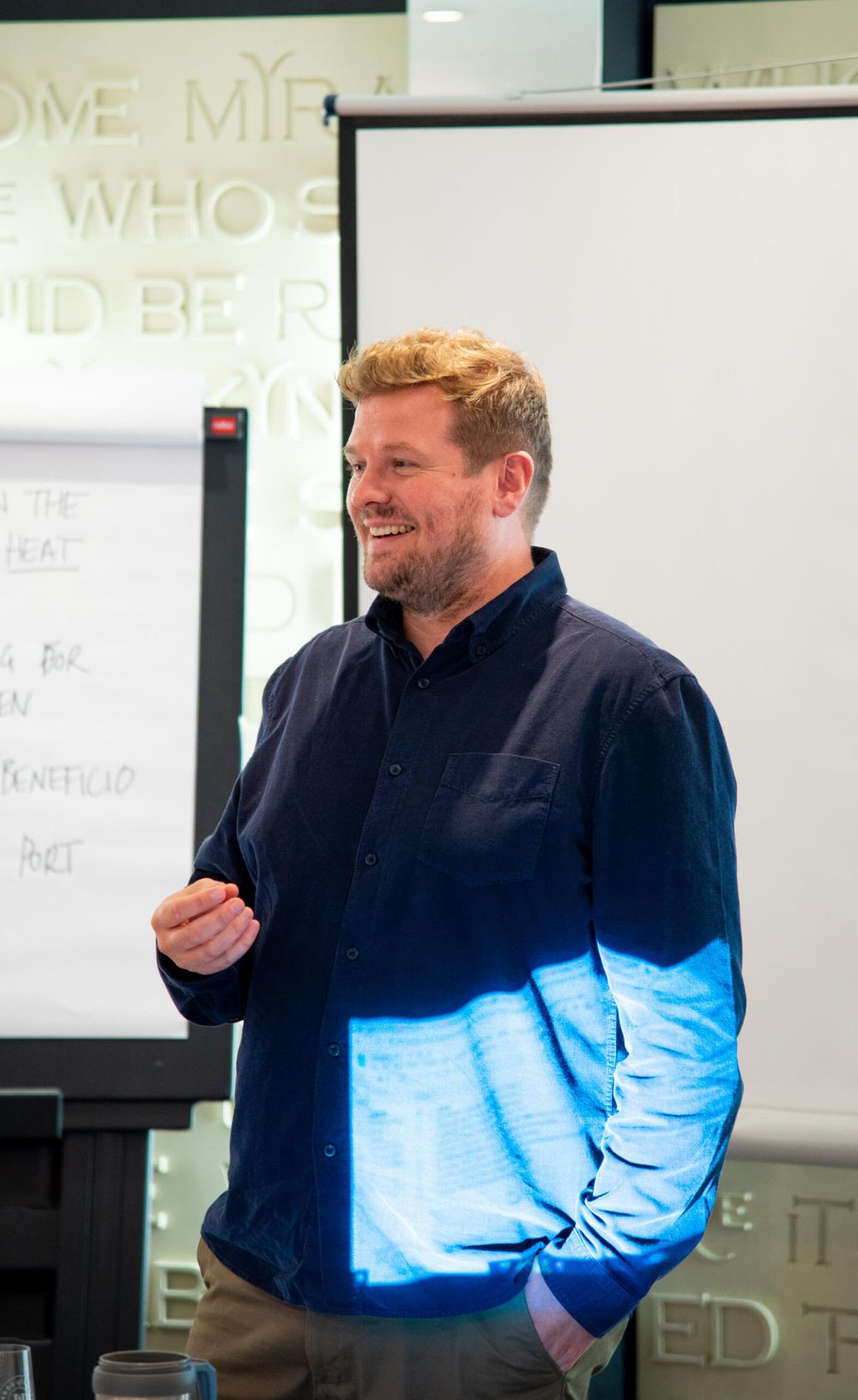
Jim Gore has enjoyed a wide career working both in the on and off-trades (with Oddbins) before switching to wine education
Jim: Mostly from the educational side rather than the business itself. Get to know your students, understand what they want from the course, recognise that they have their own stresses and to treat everyone as an individual – everyone has their own learning styles and so you need to be sensitive to that. Not everyone studying wine qualifications had the best time in formal education so you need to be adaptable. Make sure you are prepared and if you don’t know the answer to something make sure you never ‘fudge’ an answer, you will be sniffed out quickly by your students on their mobile phones.
One point I learned is to clearly understand and communicate what the students need to be able to achieve by the end of the course. It is your responsibility to build the skills (and sometimes temperament) in your students to be able to use the materials effectively to answer the questions confidently. Some would argue that working hard is the main path to success but I would argue you need to work smart instead and that is something I learned very quickly at the WSET.
Why did you want to go it alone and set up Enjoy Discovering Wine School?
Erica: A move to the south coast of England in 2007 meant setting up my own WSET Approved Programme Provider (APP), although I continued to mainly work for the Trust in Bermondsey Street. The decision to make the EDW School my main focus came about when the newly opened Limewood Hotel in the New Forest approached me to train their staff in house. Following this I steered EDW towards tailored client courses, which ranges from independent HORECA businesses to nationwide, and in the case of a private airline global, large companies who appreciate our flexible and adaptable approach to training their staff.
What is your business model and who are your typical students?
Erica: We run WSET Levels 1 to 4 (diploma since 2020) courses in Winchester for open enrolment, which we moved to Zoom, posting out wine samples from April 2020, and are now slowly moving back into bricks and mortar.
Post March 2020, our main students are consumers. The lockdown ‘need to learn stuff’ craze and our ability (being small) to quickly adapt, meant that we were running WSET Levels 1 to 3 virtual courses by April 2020, bottling and posting out wine samples to all of our students. Now we are seeing the hospitality industry coming back, although extremely slowly due to their various challenges, who were previously our main clients.
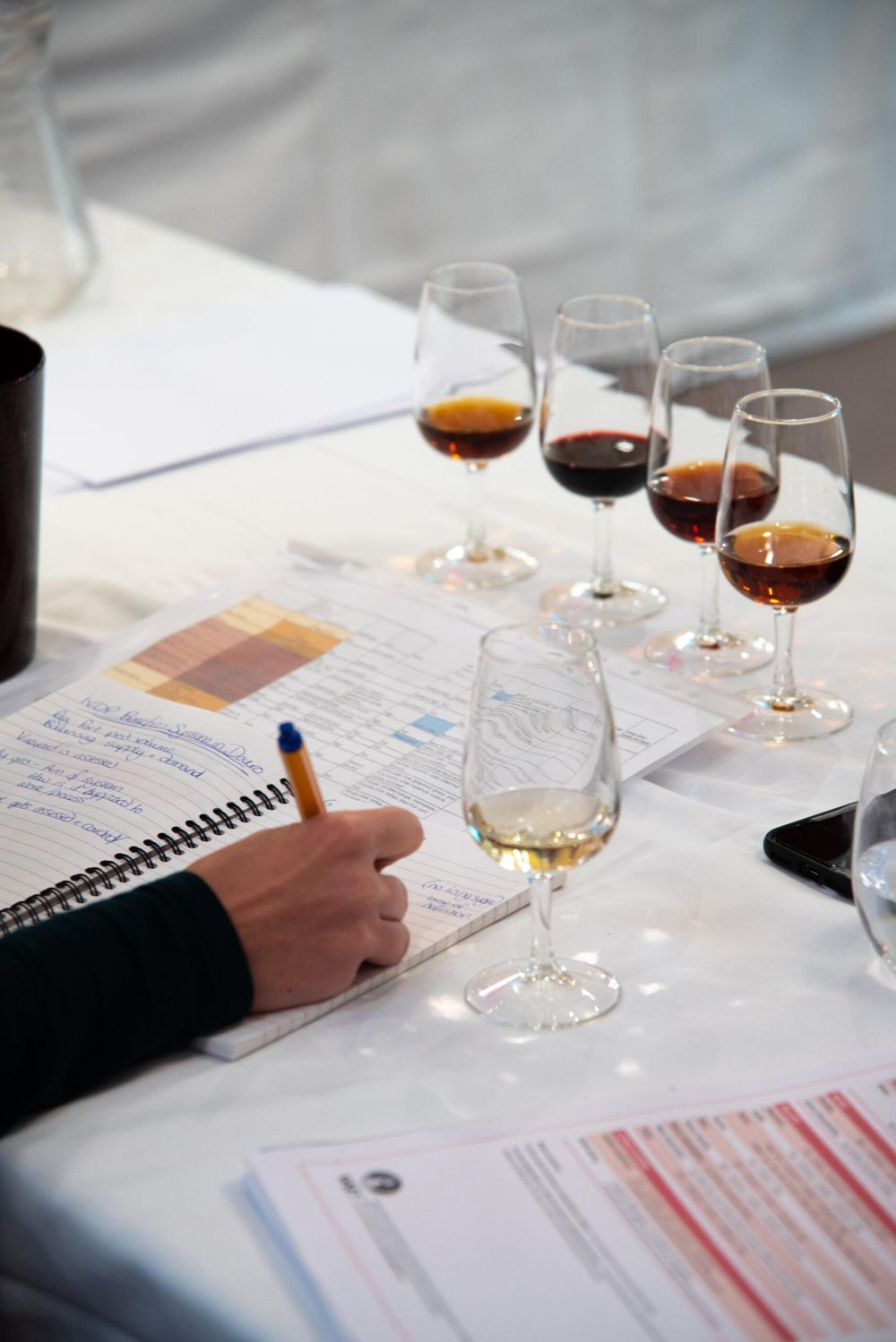
The lockdown has allowed Jim Gore and Erica Dent to offer a wide range of online courses
During lockdown we wrote a complimentary course, Match Fit, for those struggling with the D3 theory revision having previously studied the course elsewhere (some a long time ago) and needed extra focus and motivation. This follows our philosophy of creating small teams to work together as very supportive study-buddies but with structured guidance on how to work together and keep each other motivated. The course focuses on ‘how to answer’ the questions rather than a repeat of the materials. Students come out of the course focused and re-energised.
What do you see as your point of difference in what is such a competitive area?
Erica: Small and personal. If we need to adapt and be flexible for a student’s individual needs we will do our utmost to make that happen if possible. My colleague (of 11 years) Helen, supports Jim and I throughout and spends quite a bit of her time on the phone talking with anyone that needs that extra support.
We also have a second part to the journey whereby for Levels 3 to 4 we ensure the students start their constructive learning before coming on the courses (although maybe others do this too); whereby we give them mocks based on their current level of knowledge, but with insights into what to expect with the different assessment criteria for their next step up.
Jim: Listening to the students and encouraging them individually, also giving them as many opportunities to show their understanding and marking and improving as we go. We don’t teach the course and then assess, we do it in every session each session. When something hasn’t been understood then we have the option to make alterations to the next session to give more room to the areas that need more work.
We view ourselves as coaches and the class as a team, the students form a bond with us and also with their teammates. They collaborate during the sessions and on homework tasks as they go along, that way when you are having a stressed out week someone else can take the pressure off, we never want anyone to feel adrift.
How do you promote yourself and recruit new students
Erica: Badly. I need to work on that bit, but we have some wonderful graduates who sing our praises and so a lot of our customers are referral based.
Jim: I like word of mouth and Instagram live sessions where I taste with students on certain topics. I have also done podcasts with Interpreting Wine. I think it is important to give a bit of my free time away to students who aren’t able to join our courses.
What changes have you had to make during lockdown and Covid?
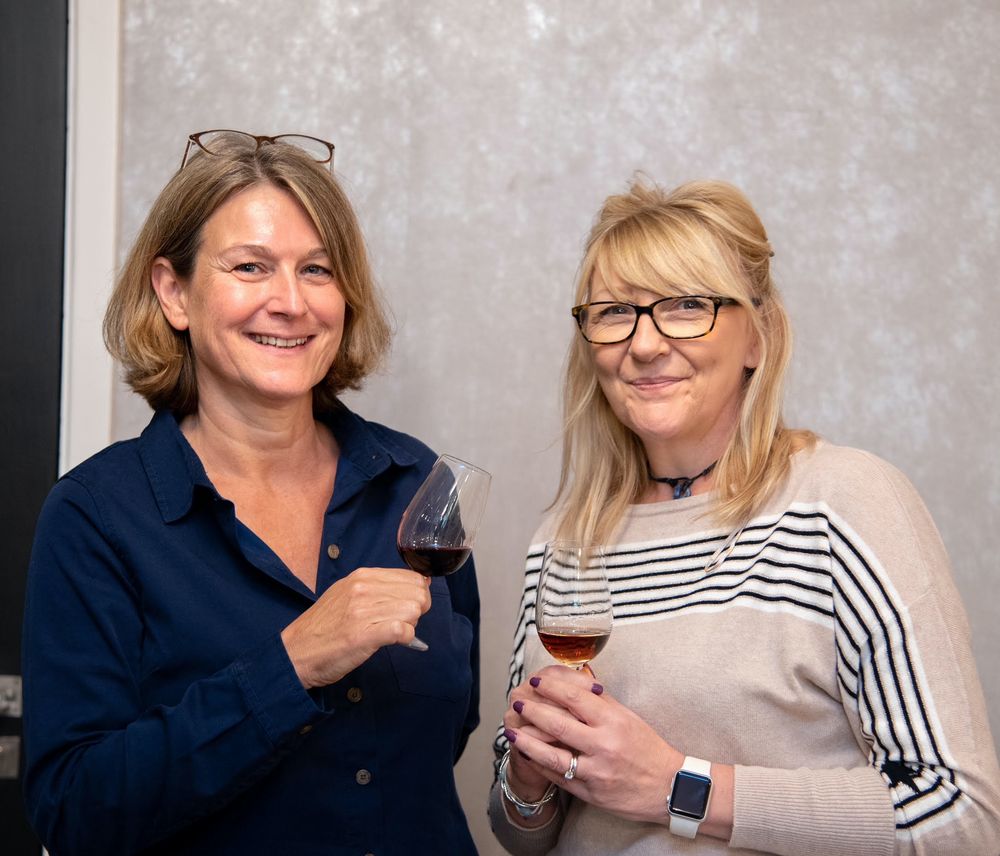
Erica Dent with wine educator at Helen Evans who works with her at Enjoy Discovering Wine
Erica: Apart from having ordered small bottles to send out samples even before 23 March 2020 (I previously taught for an APP in Italy, he had been warning me to stay home); Helen, Jim and I rewrote the session plans for all of the WSET levels 1 to 4 to adapt them to learning virtually. We use various platforms which all ensure that the students feel as engaged and connected to us, and each other, as they would have if they had been in a physical environment.
Jim: We now live mark collaborative documents on Google Drive. We can nip and tuck any sentence the students write to make it shorter and more detailed. The feedback loop is now instant, previously we had to take in hand-written work and mark it and send it back, it is an old fashioned and long-winded process, instant is much better. The wines we both send out are in resealable bottles so we can then use Argon gas to re-protect them and then maximise times we can use a sample across different sessions. It also means if your palate is not on form then you can try the wines the day afterwards.
How many are those do you see being here for the long term?
Erica: We are slowly going back into class but at the moment people are not signing up to go ‘out’ for education, they still want to do that at home in the main. Therefore, we will be keeping the courses in this format for the near and perhaps long term future. Our numbers and results have been as excellent as ever, our pass rates are in the 90% plus range, with our first cohort of 15 Diploma students all achieving success in the tasting element of the Diploma D3 module, and that was through posting hundreds of 55mL samples to them.
Jim: Mostly I would say, in class we really miss having the work created by the students being saved on a shared drive, we have recently made students bring their laptops to class so we can emulate that. The only thing I genuinely miss online is a big flip chart, I like to draw to help explain, that is slightly challenging online but not impossible. It is online for me going forward.
What do you see as the big differences between running courses online and in person and how do you try and get round them?
Erica: Feedback has been brilliant but some people want to physically touch the bottles, the closest we can do to that (which we do) is send pictures of the labels.
For Zoom (we do not do any online-only courses) we have created activities that work around small groups (in breakout rooms) and then bring them back together to discuss as a whole group. The challenge here is that, unlike putting people in small groups around tables where you can listen in, their conversations are private so we cannot check that they are not going off-track … to be honest I see their privacy as a benefit though.
We just ran a four-day Diploma course in Winchester and the benefits there are that we used flipcharts for activities, whereas on Zoom we use Google Drive to create their revision work, that does lend a different feel to the sessions. On Zoom we use WhatsApp for individuals to share their personal charts and drawings, so we create a shared library of their work on those two platforms.
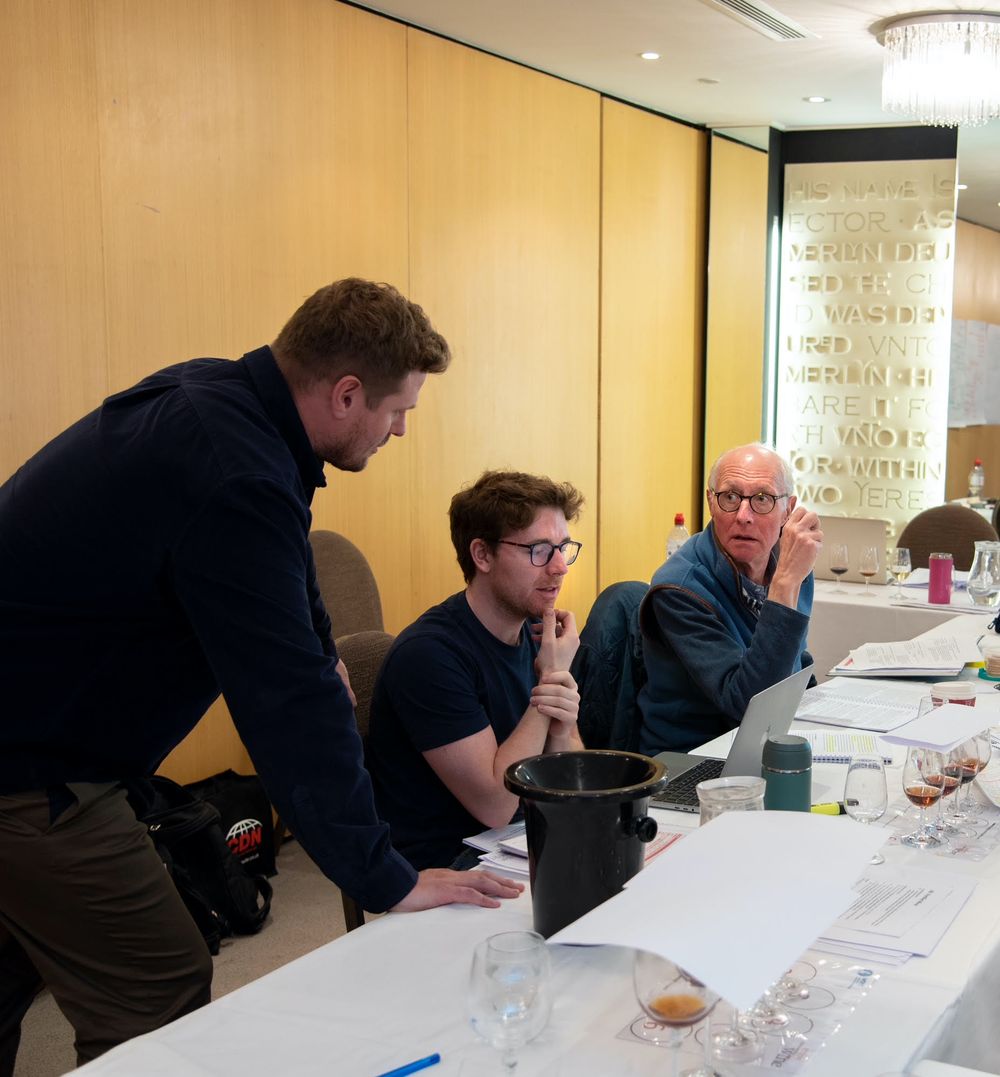
Jim Gore sees in person and online training being very much the way forward for wine education
Jim: The students are no doubt more tired in class, I think it is because of the travel, they have to bring glasses with them, lunches can be disruptive, noise from outside can also be disruptive. We find more internet issues in venues compared to home internet so there are certainly more issues with in-class. I think it generally depends on your home situation, whether or not it is a suitable learning environment, we haven’t had any issues so far. We do find that appearance, as ever, is still a nightmare, online everyone has a different lighting condition and you end up calibrating students to their room rather than the exam venue which is tricky. Erica and I both taste the wines together beforehand and then again during the class so we can be confident on the calibration.
What changes would you like to see to formal wine education to make what people learn about wine more relevant to the average shopper and wine drinker?
Erica: The cost, but that is tricky as it just does cost a lot of money for WSET to administer qualifications. I strongly believe that the WSET Level 1 course is extremely relevant to the average wine shopper and drinker, but it is very expensive for us to buy the WSET materials and examinations, but that is what it is. I think a lot of people jump straight to Level 2 because it is also for beginners, but it is a lot of information, so it is a shame to me when people skip straight there, as Level 1 (even on line) is really good fun and for the majority a worthwhile and on-point experience.
Jim: I think most of wine education aims to simplify wine terminology, so although it seems formal it is undoubtedly useful, I always imagine trying to have a conversation with anyone without some guiding hand to minimise ‘flowery language’. That said, I am not that keen on assessing appearance or body, I feel they are less important than flavours. I also think texture is very important for white wine but I think I would be in danger of complicating things for the average shopper!
What advice would you give to someone who is looking to do further wine education like the advanced, diploma or Master of Wine – what do they need to expect and prepare themselves?

The WSET Graduation ceremony every January is the ultimate achievement for many of the students working with Jim Gore and Erica Dent
Erica: Make sure you note the recommended study time for each level. The step up between the levels is almost always underestimated by students. We make it very clear to students how many hours they need to timetable for extra study. I think because it is wine and therefore a pleasurable thing, people think ‘how hard can it be’… extremely, is the answer. Even Level 1 is a big challenge for some who are not wine-lovers but doing it for work, but that is what makes it such an engaging subject to study.
Jim: Learn how you study well, do you enjoy reading, doing, drawing, listening, writing or teaching? Then adapt your study/revision programme to your strengths. Also use your teammates to support and fill in the gaps in your skill base. Make it more collaborative. Asking winemakers and getting information directly from the source is essential for the MW but at all other levels it will foster a type of engagement that you cannot get by reading alone, even seminars where winemakers are in attendance gives a real and direct access to the truth. The final point is to understand what is expected of you in the examination. This will come from the examiners reports and past papers, and try to find a mentor who has been through the process successfully.
What skills do you need to be a good wine educator?
Erica: Listening and being adaptable. Facilitating the group to become a motivated and supportive team.
Jim: Empathy, energy, to be humble, know your students so you can use their skills to help the whole class understand. Telling them ‘stuff’ is dull and old fashioned.
What are the ambitions and next goals for Enjoy Discovering Wine School ?
Erica: Having only just started running WSET Diploma our focus is solely on WSET at the moment. This includes our EDW WSET Alumni Club which is for WSET holders who want to carry on learning but have reached their WSET qualification threshold. Since lockdown this has been phenomenal where each month we have had winemakers’ from around the world join us: Viviana Navarrete (Vina Leyda); Ken Forrester; Katie Jones; Frederic Drouhin; Natalie Christensen (Yealands); Manual Lobo (Crasto); Stellios Boutaris (Kir-Yianni) have been highlights. We post out six (55mL) wine samples to taste along with the producer and ask them anything, a very valuable opportunity.
Jim: I would like us to maintain contact with all the students we have collectively taught all over the world (Sweden, Germany, France, Spain, Italy, Switzerland, Luxembourg, New Zealand, Australia, Hong Kong, Singapore, India, Lebanon, Turkey, Japan, Canary Islands, USA, Canada) during the pandemic, that is something that shouldn’t be lost and should be capitalised on.
Anything else you want to say?
We are running a Zoom 90-minute WSET Diploma overview session with Q&A on December 12, 10.30AM to noon. This is for those students starting the Diploma course (or joining our free D1/2 modules leading into the D3 sessions), or anyone that just wants to understand the course structure and our methodology.
- If you would like any more information about The Enjoy Discovering Wine School then click here and if you would like to find out more about the Global Wine Academy then click here.
